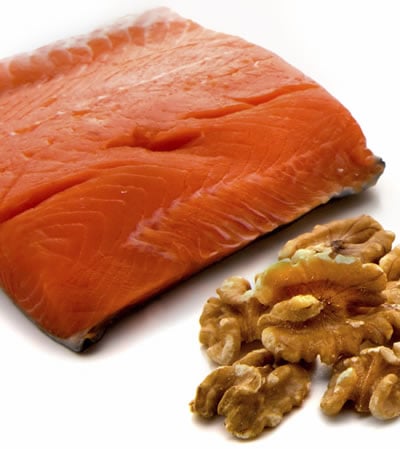Omega-3 Fatty Acids | Benefits and Risks
Omega-3 fatty acids have been shown to protect against heart disease. Fish oils are rich in omega-3 fats, but they may come with risks.

Omega-3 Fatty Acids | Benefits
The benefits appear numerous, but exactly how omega-3s protect against heart disease is still under investigation. They generally do not lower LDL (bad) cholesterol levels, but they may reduce cardiovascular events by reducing blood clotting, lowering levels of inflammation, stabilizing heart rhythm, and/or lowering triglyceride levels.
Regardless of the mechanism, the evidence that an inadequate intake of these essential fatty acids increases the risk of dying from a heart attack is compelling.

EPA/DHA
Examples of foods rich in omega-3 fatty acids include most seafood, particularly fatty fish such as salmon, mackerel, herring, sardines, whitefish, and trout. The omega-3s in fish are mostly longer-chain omega-3 fatty acids, called EPA (eicosapentaenoic acid) and DHA (docosahexaenoic acid).
ALA
Some plant foods have a shorter-chain form of omega-3 fatty acids, called ALA (alpha-linolenic acid). Foods containing ALA include soy products, such as tofu and soybeans (edamame), as well as some nuts and seeds, like flaxseeds and walnuts.
But here’s the problem: We have good evidence that EPAs and DHAs protect against heart disease. We have insufficient evidence that ALAs do the same. It’s likely they help. But some researchers believe that at least some of our omega-3s should be the longer-chain types, found mostly in fish.
Omega-3 Fatty Acids | Risks
Do keep in mind that large excesses of omegas-3s can increase the risk of bleeding and hemorrhagic stroke. Omega-3s in large amounts might also increase the risk of some cancers, including prostate cancer.
Safe Recommendations
If you’re consuming fish two to three times a week, as the Pritikin Eating Plan recommends, you’re likely getting plenty of omega-3s for heart health, but not enough to cause any harm.
Bottom Line On Omega-3 Fatty Acids | Benefits and Risks
Most physicians prefer that their patients consume longer-chain omega-3s – the EPA and DHA fatty acids found in fish. And when prescribing fish oil pills to lower high triglycerides and/or reduce inflammation, they specify supplements largely made up of EPA and DHA.
But most people do not need to take omega-3 pills, and large doses may cause more harm than benefit.
Do Fish Oil Pills Work?
Moreover, recent research has called into question the effectiveness of supplements. Some scientists are asking: “Do fish oil pills work? Do they actually have cardiovascular benefits?”
At Pritikin, we stress that foods naturally rich in omega 3s, like fish, are almost always a better choice than pills.
Spinach-Stuffed Salmon With Mango Sauce
Salmon is naturally rich in heart-healthy omega-3 fatty acids. This Spinach-Stuffed Salmon With Mango Sauce is also naturally rich in sumptuous, downright addictive flavor. You’ll keep coming back to this recipe! Make it at Home
Mustard Salmon with Brown Rice & Green Beans
Enjoy this omega-3 rich salmon filet with a delicious mustard/maple glaze served with brown rice and green beans. Best of all, it’s delivered right to your home or office. Order Online